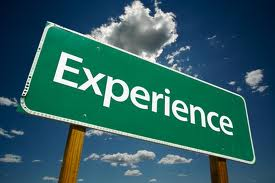Experiential learning (learning by doing)
(Ed’s Blog: “ADELANTE!”, 2012-Aug-16)
 Taking advantage of the slightly slowed-down level of activity in the last two weeks (not the crisis, but the holidays around me!), I’m in the process of reviewing a lot of the teaching materials about Operations, Supply Chain and Project Management that I’ve been building up over time for in-class teaching as well as in-company trainings. And if I look at all of these materials in my “repertoire” I see somewhere in between 20 and 30 prepared business cases Harvard-style, practical mini-cases addressing managerial issues based on my own project experiences, the occasional exercise and also an almost endless amount of colorful Powerpoint presentations explaining all kinds of concepts, theories and frameworks. You know, interesting PPT’s about capacity planning, process design, KPI-dashboard definition, inventory management, S&OP, supply chain network design, carbon footprint, and the like, you name it.
Taking advantage of the slightly slowed-down level of activity in the last two weeks (not the crisis, but the holidays around me!), I’m in the process of reviewing a lot of the teaching materials about Operations, Supply Chain and Project Management that I’ve been building up over time for in-class teaching as well as in-company trainings. And if I look at all of these materials in my “repertoire” I see somewhere in between 20 and 30 prepared business cases Harvard-style, practical mini-cases addressing managerial issues based on my own project experiences, the occasional exercise and also an almost endless amount of colorful Powerpoint presentations explaining all kinds of concepts, theories and frameworks. You know, interesting PPT’s about capacity planning, process design, KPI-dashboard definition, inventory management, S&OP, supply chain network design, carbon footprint, and the like, you name it.
And you know what? I’ve noticed that it’s particularly these Powerpoints that I’ve stopped using over the course of the last years. Why? Am I not happy with their content? Well, to be honest, if I look at them I still think they’re fairly well done. I mean, I might now want to change some shapes, font-sizes or colors, but in general terms, I’m still happy with what they show. It’s just that I don’t really see the point of using them anymore. Or, better said, I actually more and more see the point of NOT using them anymore.
Why? Because I’m more and more convinced that their value is limited, even though their content might be very valid. But there’s a fundamental component missing when using such “one-directional, master-class type” presentations in class or in a workshop environment: people sit, absorb, maybe ask a question or two, and then go home, that’s it. Will they have learned anything? Who knows. Will it stick? Unlikely, for however entertaining it may have been. Will they use what they have been explained when coming home this evening? Or tomorrow when back at work? I don’t think so, unless…
Because what’s missing from many of these presentations is making concepts into something applicable, having people experiment, breaking it down to bits and pieces that they can directly put into practice while still there, questions they can ask or reflections they should do, without the possibility to “escape” or “hide”. That’s what I think should be the real added value of a class or training session. That’s when participants should be invited and stimulated to start thinking, feeling, observing by themselves, instead of friendly knodding in agreement to the presenter when he or she explains something, that probably will be forgotten the next moment.
 Confucius already said it long ago: “I hear and I forget…. I see and I remember…. I do and I understand….”. As with many clichés, this one sticks around because it has some profound truths in it. To know about the theory is fine, but you can do that by yourself, reading the texts at home. Use your valuable class or training time to take it all one level further: into practice!
Confucius already said it long ago: “I hear and I forget…. I see and I remember…. I do and I understand….”. As with many clichés, this one sticks around because it has some profound truths in it. To know about the theory is fine, but you can do that by yourself, reading the texts at home. Use your valuable class or training time to take it all one level further: into practice!
I’ve set myself a task to perform: I am now going to see if there are even more of my Powerpoints that I can strip away from my class sessions and training programs. I would recommend other teachers and trainers to do the same. And if you’re a future student interested in a generalist MBA or similar, or even a supply chain professional looking for training to broaden or deepen your knowledge and experience in management-related areas: make sure there’s a significant experiential component in it. I’m quite sure you’ll be rewarded for your careful choice.


